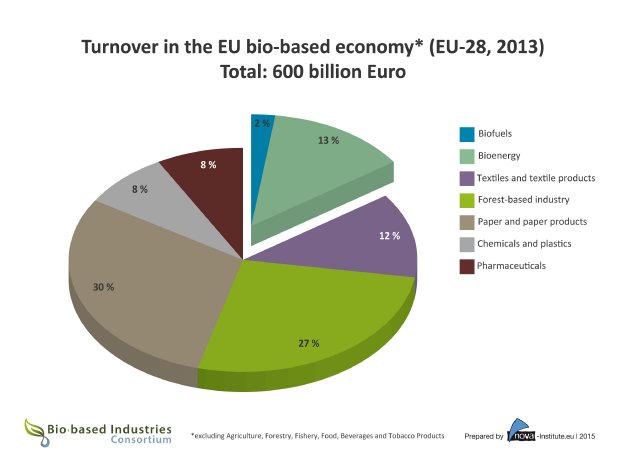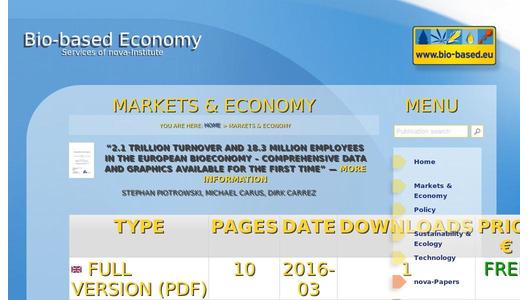Eurostat was used as the main source of data for all sectors of the bioeconomy. Some sectors, such as the forest-based industry, are fully bio-based and thus fully accounted to the bioeconomy. For other sectors such as the chemical industry, the bio-based shares were estimated and included in the data.
The analysis of the Eurostat data of 2013 shows that the turnover of the total bioeconomy, including food and beverages and the primary sectors agriculture and forestry, results in 2.1 trillion EUR in the EU-28. Roughly half of the turnover is accounted for by the food and beverages sector, almost a quarter is created by the primary sectors, agriculture and forestry. The other quarter is created by the so-called bio-based industries, such as chemicals and plastics, pharmaceuticals, paper and paper products, forest-based industries, textile sector, biofuels and bioenergy.
The bioeconomy employs 18.3 million people in total. The primary biomass production, mainly agriculture plus forestry and fishery, generates a lot of employment (58%) but low turnover (21%). The data show clear differences between groups of Member States: e.g. the Eastern European countries Poland, Romania and Bulgaria apparently are stronger in less value added sectors of the bio-based economy that generate a lot of employment. In comparison, Western and Northern European countries generate much higher turnover compared to the employment generated. The countries with the highest ratio between turnover and employment are Ireland, Finland and Belgium.
“Of particular interest,” so Michael Carus, Managing Director of nova-Institute, “are the often underrated bio-based industries, such as chemicals and plastics, pharmaceuticals, paper and paper products, forest-based industries, textile sector, biofuels and bioenergy. This sector shows considerable turnover of 600 billion EUR and 3.2 million employees in 2013 for EU-28.”
The data show an overall slight increase in the bio-based share of the chemical industry in the EU-28 from 5% in 2008 to 6% in 2013. The raw materials used by the chemical industry are about 50% organic (fossil and bio-based) and about 50% inorganic (minerals, metals).
Only taking the organic part into account, the overall bio-based share increased from 10% in 2008 to 12% in 2013. Denmark stands out as the one Member State with the highest bio-based share in the chemical industry in 2013, which is mainly due to the high production of enzymes. Latvia and Sweden follow primarily due to a large production volume of charcoal and tall oil.
With regard to investments, the last annual survey from the end of 2014 showed that BIC members intended to invest 1.1 billion EUR during 2014 to 2015 in bio-based industries – mainly demo and flagship projects, of which more than 820 million EUR were pure private investment. Private investments in the amount of more than 2.1 billion EUR are in the pipelines of those same BIC members for the time between 2014 and 2020. Most of the short-term investments will take place in the lignocellulosic and forestry based value chains.
Download the graphic “Turnover of the bio-based economy EU-28:2013” at the link below:
http://bio-based.eu/media/16-03Turnover%20in%20the%20EU%20bio-based%20eocnomy.jpg
The full report can be downloaded here: www.bio-based.eu/markets
For additional data on the bio-based economy, even on Member State level, please contact michael.carus@nova-institut.de from nova-Institute directly.
About nova-Institute
nova-Institute is a private and independent institute, founded in 1994; nova offers research and consultancy with a focus on bio-based and CO2-based economy in the fields of feedstock, techno-economic evaluation, markets, LCA, dissemination, B2B communication and policy. Today, nova-Institute has 25 employees and an annual turnover of more than 2 million €.
More information: www.nova-institute.eu
Contact: Michael Carus (Managing Director): michael.carus@nova-institute.de
About the Bio-based Industries Consortium
The Bio-based Industries Consortium (BIC) is a non-profit organisation based in Brussels. It represents the private sector in a public-private partnership (PPP) with the EU on Bio-based Industries (BBI).


